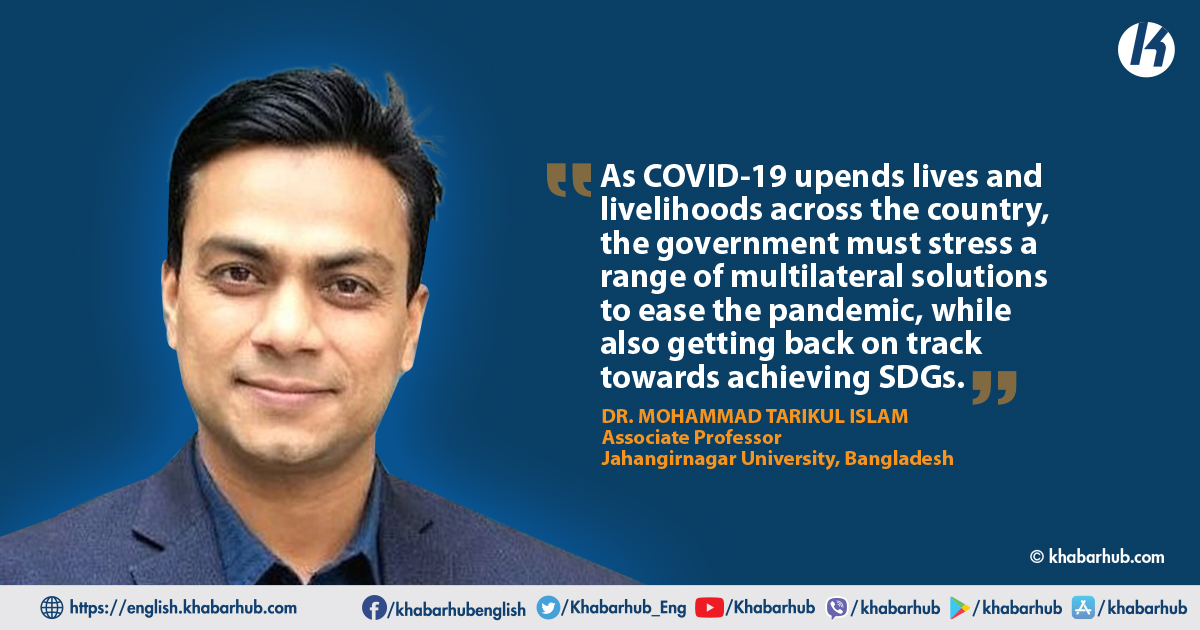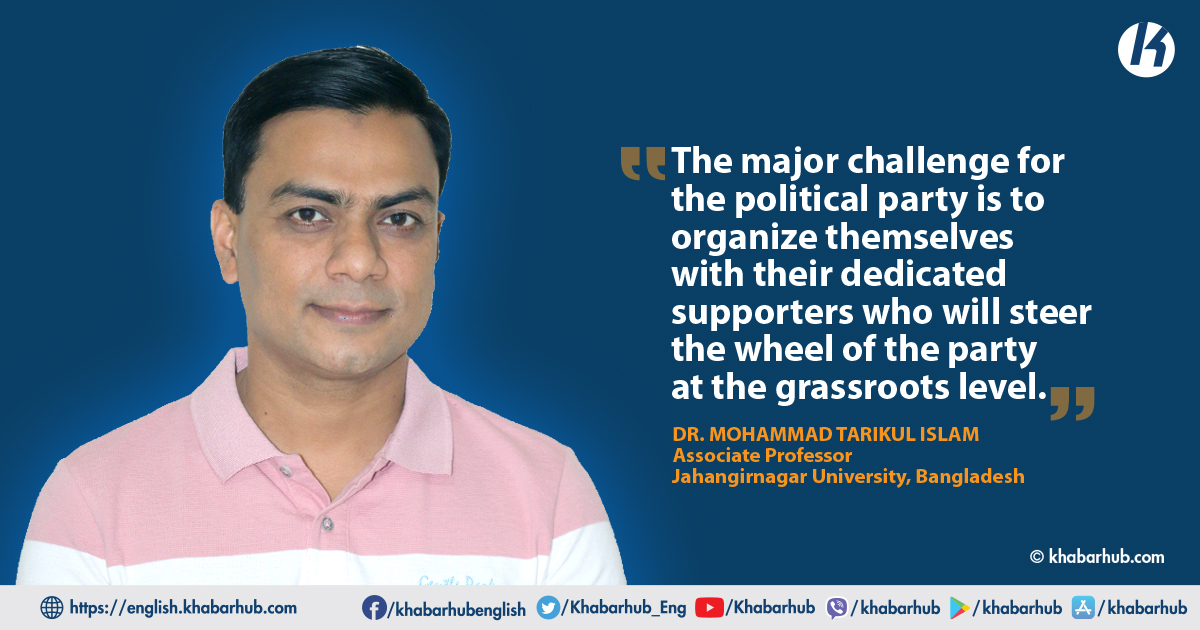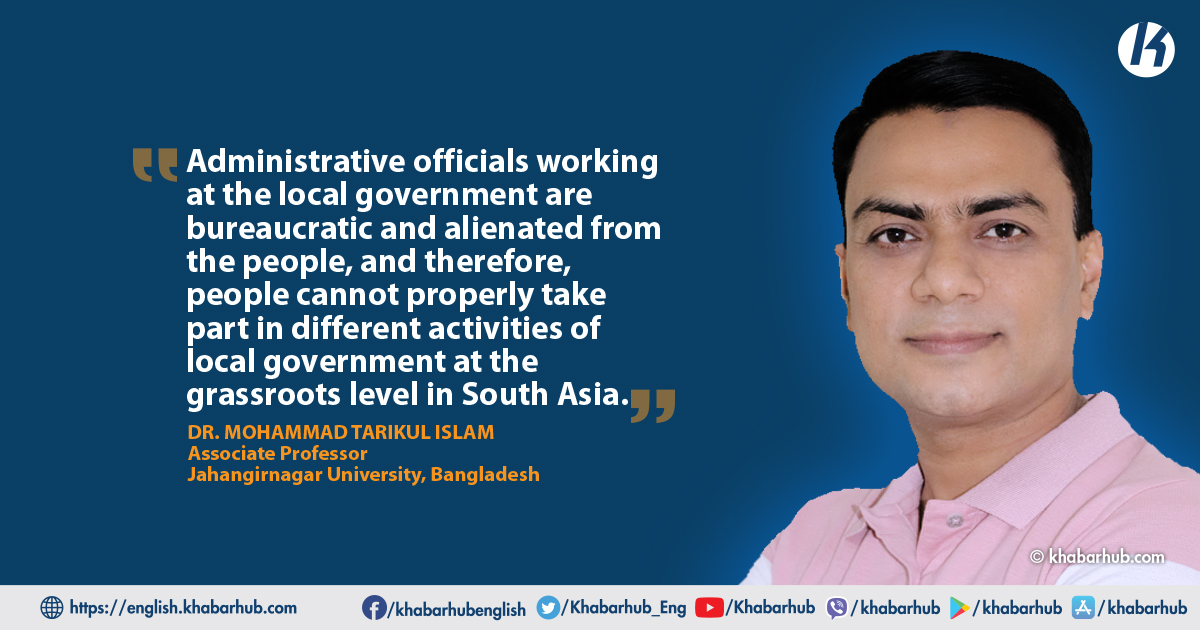0%

In an interview with the Khabarhub, South Asian Scholar and Local Government Expert Dr. Mohammad Tarikul Islam opens up about the importance of participatory grassroots local government, party-line election, standing committee, access to the decision making process, and localizing SDGs amid the COVID pandemic.
Professor Islam is an Associate Professor of Government and Politics at Jahangirnagar University. He has been a Visiting Scholar (Research Fellow) at the University of Oxford, the University of Cambridge, and SOAS (University of London).
Dr. Islam also enlightens on the debate whether local government can regain confidence in implementing SDGs surpassing the adverse effects of COVID-19. Excerpts:
Why participatory grassroots local government is indispensable for delivering SDGs in rural Bangladesh?
You know, the local government not only ensures improving access to basic services but provides an effective platform for the community people to participate in the decision-making and development process undertaken for them.
Strengthening local government in rural Bangladesh is perhaps the only viable solution by which government can translate policies into inclusive development and prosperity.
The endeavor of the Bangladesh government toward the “localization” of global agendas is progressively expanding to the grassroots level. It is a testimony of the strength of our collective endeavor.
The Local Government (Union Parishad) Act of 2009 strengthens the local government by incorporating the global best practices for direct participation of active citizens in planning and social accountability.
Are local governments providing opportunities to the people, irrespective of party affiliation, to participate in the development activities?
To me, local representative democracy has opened up an opportunity for the local people to be mindful in selecting their local leaders as well as engaging in the development process at the grassroots level in South Asia.
Such party-based local government election enables elected representatives to get the maximum benefit from the political government.
The central political party in power implements its agenda at the local level with maximum backing of local government elected representatives.
For instance, past observations of local government in Bangladesh show that the successive governments had to establish some kind of local government structure in order to mobilize the support of the rural communities in their favor by providing welfare measures.

Apparently, the colonial pattern of administration in the local government has been categorized as elitist and alienated nature.
Administrative officials working at the local government are bureaucratic and alienated from the people, and therefore, people cannot properly take part in different activities of local government at the grassroots level in South Asia.
The weakness of its socio-economic base remains a key obstacle in the way of democratic education through local government. The unequal economic structure trends to influence the local bodies by pro-partied class.
They often tend to suit their class interest and purposes. As a result, LG cannot render proper services to the people at the local level.
Besides, the presence of the local elite dissuades the general public from participating in the local government, which results in a less effective local government. In rural South Asia, this remains a major impediment to popular participation in local-level elections.
Such attitude results put the candidates who have lost and their supporters in conflict with the winners.
Consequently, they do not cooperate with the winners, resulting in a challenging situation for the functioning of the elected council.
Politico-administrative contradictions often disrupt the very functioning of local government. Hence, local government could not successfully provide opportunities to the people, irrespective of party affiliation, to participate in the development activities.
Can Standing Committee able to engage the community in the development process?
The local government is the only institution to ensure good governance, development planning, implementation, transparency, and accountability for rural areas in Bangladesh.
The Local Government (UP) Act 2009 introduces the concept of Standing Committee (SC) in the UP to support the Parishad in ensuring transparency, accountability, and people’s participation in planning and implementing for ensuring better governance and service.
SC helps drive decision and provide an important means of oversight on the function of governing bodies.
The reasons behind the sluggish performance of SC may be attributed to a number of factors such as lack of initiatives of UP members, lack of pressure from the common people, lack of political pressure, lack of skills required for planning and implementing development programs at the local level, no specific terms of references of SC and unwillingness on the part of UP Chairman to delegate authority.
Ignorance and reluctance appear as impediments to the effectiveness of the committee and low participation of the members in the committee meeting signposts that fruitful discussions are not held in the committee meetings.
How local government can strengthen SDG-related activities surpassing the adverse effects of COVID-19?
As COVID-19 upends lives and livelihoods across the country, the government must stress a range of multilateral solutions to ease the pandemic, while also getting back on track towards achieving SDGs.
If the 2030 global agenda is implemented at the local level on the basis of partnership with people of all segments of society, a massive socio-economic, environmental and ecological development will occur and the targets of SDGs will then be easily achieved.
SDGs localization plan would be a quick-yielding panacea to counteract the Covid-19 fallout both in the medium and long term.
Can the local government bodies reinforce management and planning capacities to shape a multi-stakeholder approach for attaining SDGs in a post-COVID pandemic?
Acknowledging the vital role of local government in the achievement of the SDGs will enable us to mobilize local stakeholders and to create new partnerships, based on a common understanding of our shared humanity.
We must remember that a critical challenge encountered in the early implementation of the MDGs as opposed to the SDGs was the initial lack of grassroots consultation and support and, most importantly, community ownership.
Local government must have the means and the capacity to improve administration, anticipate demands, plan and implement solutions.
To upscale efforts, we need greater cooperation and national and international coordination mechanisms, as well as enough resources to make this happen.
It needs to ensure that citizens are involved in the decisions that affect their future.
“Effective, accountable and transparent institutions” and “responsive, inclusive, participatory and representative decision-making at all levels” require a clear institutional framework, reinforced management and planning capacities, participatory mechanisms, and regular financial negotiations between all levels of government and local communities to define priorities and plan of action.

It is deceptive that participation is the key to the inclusion of community people in development efforts and the human element in development efforts persuades managing change in an effective manner.
A strong local government with adequate resources and authority is a must for the localization of SDGs and improved governance at the grassroots level.
The major challenge for the political party will now be to organize themselves with their dedicated supporters who will steer the wheel of the party at the grassroots level.
As of now, almost all parties are centrally governed, and some are pocket-based political parties with media coverage only, with no units and supporters at the grassroots level.
The major challenge for the political party is to organize themselves with their dedicated supporters who will steer the wheel of the party at the grassroots level.
The government strives to foster dialogue with all stakeholders through the Local 2030 initiative, and to mobilize a multi-level coalition around localization, which can accelerate our efforts while setting enabling national frameworks that empower local actors to develop and lead their own strategies aligned with the SDGs.
Empowering local government has become imperative for putting rural Bangladesh on the track of inclusive development and prosperity.
A strong local government with adequate resources and authority is a must for the localization of SDGs and improved governance at the grassroots level.